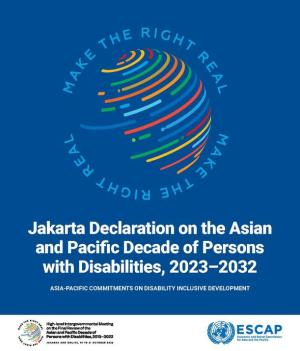
Overview
The Jakarta Declaration on the Asian and Pacific Decade of Persons with Disabilities, 2023–2032 was endorsed by the Economic and Social Commission for Asia and the Pacific (ESCAP) through a resolution (E/ESCAP/RES/79/5) at its seventy-ninth session on 19 May 2023. The Jakarta Declaration was adopted by ESCAP member States at the High-level Intergovernmental Meeting on the Final Review of the Asian and Pacific Decade of Persons with Disabilities, 2013–2022 held in Jakarta, Indonesia and online from 19 to 21 October 2022. This landmark Declaration underscores a rights-based approach to empowering over 750 million persons with disabilities in the Asia-Pacific region and fostering their meaningful participation in society.
Reaffirming existing frameworks on disability-inclusive development
The Jakarta Declaration reaffirms the continued importance and relevance of the Incheon Strategy to “Make the Right Real” for Persons with Disabilities in Asia and the Pacific and the Beijing Declaration, including the Action Plan to Accelerate the Implementation of the Incheon Strategy. ESCAP member States recommit themselves to continuing the realization of the 10 goals of the Incheon Strategy. In addition, the Declaration aims to support the full implementation of the Convention on the Rights of Persons with Disabilities and the 2030 Agenda for Sustainable Development.
Highlighting six priority areas for accelerated actions
The Jakarta Declaration calls for a whole-of-society approach to disability-inclusive development and outlines six priority areas for accelerated actions:
- Harmonizing national legislation with the Convention on the Rights of Persons with Disabilities, including reviewing legislation, integrating reasonable accommodation into all national policies and programmes, and strengthening independent mechanisms to address and respond to grievances.
- Enabling meaningful participation of persons with diverse disabilities of all ages in planning, decision-making, implementation and review of policies and programmes, and political processes.
- Advancing universal design-based accessibility of the physical environment, public transportation, knowledge, information and communication, and other public facilities and services.
- Galvanizing the power of the private sector, including in developing disability-inclusive public procurement policies and mainstreaming disability inclusion into workforces, products, supply chains, and media.
- Promoting a gender-responsive life cycle approach to disability inclusion, including through social protection schemes, early childhood intervention, and policies responding to intersecting forms of discrimination.
- Closing disability data gaps and strengthening progress-tracking of disability-inclusive development, building on synergies with monitoring the Sustainable Development Goal progress.
The adoption and endorsement of the Jakarta Declaration marks a pivotal moment in the Asia-Pacific region’s pursuit of disability-inclusive development. This milestone document, building upon the successes and lessons learned from the past three consecutive Asian and Pacific Decades of Persons with Disabilities (1993–2022), stands as a testament to the region’s unwavering commitment to advancing disability rights and inclusion. It charts a transformative course for the next Decade, aiming to break down barriers and create a more equitable and inclusive society for all.

